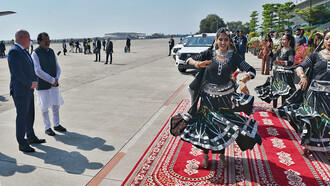Bilateral and multilateral ‘aid’ is one of the world’s biggest ‘industries’, with billions of dollars (euros/pounds/renminbi/what-have-you) flowing from the rich countries to the poor. It is a sector that has been both praised and castigated, depending on the outlook of the commentator and the kind of evidence being cited. I do not want to go into the nuances of whether the global ‘cooperation’ agencies (as many now prefer to call themselves to be free of the pejorative connotations of 'aid’) are doing more harm than good. Whilst aid can indeed assist in dealing with poverty and joblessness, the larger picture is that its agencies are often acting out of self-interest (typically, for instance, with loan-giving that means a net reverse flow from ‘recipient’ to ‘giver’ countries), not challenging the inequities and historical erasure embedded in the indebtedness of 'poorer' countries, and imposing conditionalities such as ‘structural adjustment’ that undermine economies and ecologies in the ’recipient’ countries. There is considerable critical analysis on these trends by scholar-activists like Susan George and William Easterly and groups like Transnational Institute and Focus on the Global South. A recent paper by Jason Hickel et al. calculates that what the North got from the global south in 1990-2015 in terms of embodied labour and resources, is 30 times more than the aid they gave!
Rather, I want to describe what I think needs to happen if this sector is to truly become meaningful to dealing with the multiple local-to-global crises the world faces. Most importantly, to my mind, is for such agencies to adopt decolonised approaches not only in relation to those they support but also for and within themselves.
On a daily basis, we are bombarded with depressing news: growing authoritarianism in many countries, rapidly rising inequalities, war and conflict, ecological and climate catastrophe, health crises related to both poverty and affluence, and the stranglehold of banks and mega-corporations in all aspects of our lives. The body-blow that the COVID-19 virus delivered (made far worse by the drastic economic shutdowns that governments imposed) has made it even more difficult to be hopeful of humanity’s future. But there are powerful counter-trends, which we need to understand, take inspiration from, and help nurture and sustain. There are thousands of movements of resistance to the dominant systems of statism, capitalism, patriarchy, racism, and anthropocentrism. These are refusing to accept the orthodoxies of what this system is telling us about ‘development’, ‘progress’, and so on. Sometimes emerging from these, sometimes independent, there are also thousands of initiatives at meeting human needs and aspirations in ways that are ecologically sensitive and equitable.
The Flower of Transformation
Movements of resistance and constructive alternatives can be seen to be placed within or in the intersections of five spheres, making up a Flower of Transformation: ecological integrity and wisdom, social justice and well-being, radical and accountable politics, economic democracy, and culture-knowledge diversity (see figure below). At the core of this flower are ethics or values, embedded in a pluriverse of worldviews and practices of well-being that may be millennia old (as in the case of many Indigenous peoples) or newly emerging from within industrialised, modern societies. These values include solidarity, interdependence, diversity, autonomy, peace, respect, creativity, joy, human rights and the rights of nature, equality and equity, dignity, collective and cooperative thinking and working founded on the commons, and others. The intersectionality of human action in this Flower is crucial to understand and promote, for it is all too easy to get stuck in thematic silos and neglect related issues, sometimes with unintended negative consequences, an issue I will come back to below.

Even during the COVID pandemic, several communities and collectives were able to survive much better than others. In India, the Vikalp Sangam process put together several volumes of stories of COVID-time resilience of forest-dwelling communities, women farmer groups, youth collectives, urban neighbourhood initiatives, and others. More worldwide, the Global Tapestry of Alternatives (GTA) has collated two volumes of similar resilience. Much can be learnt from these stories on how we can cope with crises as communities, if we have relative independence from the globalised capitalist and statist system, and if we are able to work on multiple spheres of transformation including those relating to social justice.
What Can International Cooperation Agencies Learn?
If agencies involved in international or global cooperation (‘donor’ and philanthropic institutions, governmental or private) want to be meaningful in the move towards justice and sustainability, they need to learn the crucial lessons emerging from radical resistance and constructive alternative initiatives. The vast majority of such agencies are involved in ‘development’, with the stated objectives of helping the ‘poor’ or deprived. Their narratives have evolved considerably from that of charity approaches, to ‘empowerment’ and ‘enabling’. Yet both in concept and in practice, much cooperation of this kind remains deeply flawed, contributing more to the maintenance of status quo than to radical transformation. This is as true of official (governmental) bilateral aid, as of grants and loans from multilateral institutions like the World Bank (or for that matter, it's supposed anti-imperialist alternative, the New Development Bank set up by the BRICS group – Brazil, Russia, India, China, South Africa), as also of big private agencies like the Gates Foundation.
What would it take for such international cooperation to go some distance in becoming truly transformative? I suggest some essential steps, within the context of an understanding of cooperation and aid being not a form of charity, but in most cases as part of reparation for the enormous damage that the global North has done throughout the colonial period and continues to do in various forms of neo-colonialism. Complete transformation towards a just world is not possible without recognising, and to the extent possible, undoing the role played by the global North in creating or furthering real poverty and deprivation across the global South. The steps below would seem to be insufficient in this ultimate objective, but could be crucial ones to begin the journey.
First, are the approaches being supported leading to fundamental changes in the structures and relations of injustice, or are they only tinkering around within these structures? Worldwide, there is increasing attention to status quoist ‘solutions’ that privilege techno fixes and market-based approaches, such as carbon trading and green growth, or superficial ones like recycling and carbon capture, or the ones sustaining corporate profits like ‘climate-smart agriculture’. These hardly help tackle the roots of the crises, becoming an excuse to continue essentially destructive activities (such as carbon emitting industries and transportation, or wasteful consumerism), and may at best prolong ecological and societal collapse. For climate, for instance, is the aid directed to just transitions, which encompass not only decarbonisation but also other elements of ecological sustainability, meaningful transitions to dignified livelihoods for workers who will be laid off from dirty industries, and special focus on the most marginalised (women, landless, ‘disabled’, those in precarious work, etc) in all this?
Second, institutions need to conduct honest, more holistic and intersectional assessments of how their support is impacting people and the environment. Well-meaning aid in one sector can have unintended negative consequences on another, and if aid agencies are going to behave in the same siloed ways that governments do, they will not even notice (or will ignore) these. For instance, programmes to help people move out of poverty can be ecologically unsustainable if they rely on the commercialisation of natural resources. And a substantial portion of aid is still for projects and sectors that are clearly unsustainable, such as for mega-energy projects.
Third, much greater focus has to be on processes rather than projects. Nearly all aid is given for short-term periods, five years at the maximum, with very few agencies guaranteeing multiple terms that can extend to 15-20 years. Experience of meaningful transformations across the world shows that it takes that amount of time for communities to own the process, for local capacities to be built up so that external support is no longer necessary. Partnering for longer term periods is crucial if the aim is to achieve greater community strength to deal with shocks and crises.
Fourth, how many support agencies, which are mostly based in the global North (including the rich in the South), actually conduct enquiries into their own economies and their impacts? A Scandinavian country may, for instance, feel very good that it is supporting tree-planting in Africa, or financing appropriate climate-friendly technologies in Asia, but does it also look internally, at its production, consumption and trade patterns and their global impact? Does it ask how it can reduce its own use of global ecological space, freeing it up for the global South to achieve security of even basic needs without taxing the earth?
And as a component of this, it would also be important to assess how countries of the North treat marginalised peoples and nature within their own borders. There are millions of people in rich countries that are deprived of basic needs, and there are the internally colonised (e.g. native populations in North America or Scandinavia or Australia), all of whom continue to suffer in many ways. Some radical cooperation agencies do indeed focus on this, devoting a part of their support to domestic causes, but most are only ‘outward-looking’, falling into the seductive trap of solving the problems of ‘others’.
Fifth, aid agencies could also take a hard look at their internal operations and structures. How much do they embody patterns of hierarchy and inequity in their decision-making and their pay packages, how do they continue to embrace (often subconsciously) various forms of patriarchy and racism, how truly ecologically conscious are they in their operations, and how open are they to be taught by those they are aiding? Many agencies still appoint people from the global North to head their operations in the global South, even where adequate capacity exists in the latter to take over such functions.
I have repeatedly talked about the global North. But the same patterns are now being seen in the increasing role of countries like China (and to a significantly lesser extent, India) in the global South. China has a huge development aid and investment portfolio outside of its borders, especially in Africa and Latin America, and people’s movements as also critical analysts have pointed to the injustices and ecological damage that this entails.
It is, of course, not possible for international aid to be completely transformative without also shaking off the shackles of capitalism and nation-statism (in all their forms, whether western or eastern, explicitly capitalist or supposedly communist/socialist). Alnoor Ladha and Lynn Murphy have gone deep into the connections in their recent book, Post-capitalist Philanthropy, with several people commenting on the need for systemic transformations in a series of webinars launching the book. But even short of this, there are many changes possible if aid agencies really believe in their own rhetoric of enabling a more just world.
One of the tools that can be used by agencies to assess both their external and internal processes for issues like justice, equity and ecological sustainability, that has emerged from the Flower of Transformation approach as part of a global project called Academic-Activist Co-generation of Knowledge on Environmental Justice (ACKnowl-EJ), is the Alternatives Transformation Format. This is aimed at getting an understanding of the extent of holism, comprehensiveness, and internal coherence of impacts. Having gained such an understanding, corrective actions to reduce contradictions and regressive trends can be considered.
Decolonising the Global North
As part of an overall re-orientation, the global North needs to not only adopt decolonised approaches for its involvement in the global South, but in fact also to decolonise itself. In the way that the rich and elite of the world behave, there are patterns of deeply rooted self-delusion, such as the notion that more and more financial riches and material possessions are pathways to happiness, or that we the privileged can help transform the lives of the marginalised. There also remains a strongly patronising attitude towards the supported, embedding relations of inequity that go back to colonial times. The philosopher-critic Ivan Illich in his typical acerbic style, had the following to say in a lecture to American students who were planning to go to Mexico to ‘help’ the poor:
I am here to suggest that you voluntarily renounce exercising the power which being an American gives you. I am here to entreat you to freely, consciously and humbly give up the legal right you have to impose your benevolence on Mexico. I am here to challenge you to recognize your inability, your powerlessness and your incapacity to do the "good" which you intended to do.
I am here to entreat you to use your money, your status and your education to travel in Latin America. Come to look, come to climb our mountains, to enjoy our flowers. Come to study. But do not come to help.
The global North’s self-colonisation denies to itself the full flowering of what it could mean to be human, the forms of freedom that can be achieved by respecting all of life, by acknowledging that all humans are equal. Perhaps it is the unease with such self-colonisation that explains the growing interest in the industrialised, modernised world for spiritual and cultural transformations? And if so, there may be a lot that the global South can do to ‘aid’ the global North in decolonising itself, in finding pathways of wisdom and peace that it has long lost. For the global North and South to build just and equitable relations, decolonisation in all its forms (and all that it entails in terms of challenging capitalism and nation-state domination) is essential. The sooner agencies of international cooperation realise this, the sooner they can be part of meaningful transformations.















